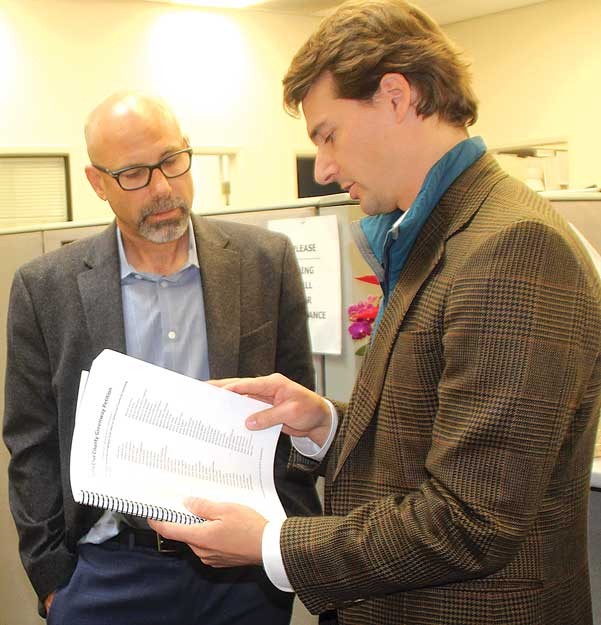SANTA CRUZ — In a future envisioned by the activist group Santa Cruz County Greenway, residents will be able to travel the length of Santa Cruz County on a bike trail running from Davenport to Watsonville.
In that vision, thousands of people using that trail will significantly reduce the load on Highway 1, thus improving commute times and solving a problem that has long plagued the county.
That vision is different from that of the county’s rail advocates, who hope that a passenger train will one day serve more than 3,600 people daily.
On Tuesday, a group of Greenway supporters handed a stack of petitions with more than 10,000 signatures to Santa Cruz County Regional Transportation Commission’s new director Guy Preston. Supporters say the petition shows overwhelming support from county residents to convert the rail line into a pedestrian and bike trail.
The petition also shows opposition to increasing rail activities — including passenger service — along the 32-mile line, the group says.
Greenway Executive Director Manu Koenig said the group was bringing the signatures to the commission in advance of a Jan. 17 meeting, during which it will consider approving the recently completed Unified Corridor Investment Study.
That study recommends a $950 million project, which includes repairing the tracks, adding a trail along the rail line and adding auxiliary lanes onto Highway 1.
In June, the SCCRTC approved a contract to allow that Lakeville, Minn.-based Progressive Rail to run freight operations in South County, and to possibly add passenger service, if feasible.
Greenway opposes those plans, saying the environmental and financial impacts make them unfeasible for the county.
The group says the project won’t be completed for at least 30 years and will cost up to $1 billion, with no clear way to pay for it.
Moreover, the estimated 3,698 trips estimated for passenger service would not make a dent in the more than 100,000 daily trips on Highway 1, Koenig said.
In a response letter written after the petitions were delivered, the RTC disputed those numbers. According to the RTC, capital costs in the UCS were estimated at $325 million for passenger rail service between Santa Cruz and Pajaro Station, and the operating costs were estimated at $15 million per year.
The issue might one day come back to voters for another sales tax measure, Koenig said, saying that the RTC has no concrete plan to pay for the rail project.
Measure D, the 2016 half-cent sales tax created to fund countywide transportation projects, prohibits the funds from being used on rail projects.
“They’re avoiding the most important question,” Koenig said. “Will the voters pay for it?”
But the RTC disputed that assertion. Instead, the study references “new state or federal grant programs, or funding sources such as a new sales tax or parcel tax, or new vehicle registration fees” if costs exceed funding.
Koenig also pointed to a recent survey by the RTC of 1,596 people, which he said showed 54 percent opposing rail service and 63 percent opposing the expansion of rail into North County.
But that is a misinterpretation of those numbers, the RTC stated.
“The questions in the survey asked respondents to mark on a scale of 1 to 5 their support for rail and freight service, so it is misleading to say that a certain percentage is opposed when they marked their level of interest on a scale,” the letter read.
Koenig cited the Nov. 6 passage of Measure L, where voters essentially showed their support for the use of the Capitola Trestle for bikes and pedestrians.
“This is not a NIMBY issue,” he said. “People throughout the county agree.”
The petition carries no legal weight. The RTC said, however, that it will use it when planning for future transportation needs.
•••
RTC staff is still seeking community input for the final staff recommendation by the commission on Jan. 17.
Deadlines for public comment to be submitted are:
• Dec. 28, 5 p.m.: For consideration by staff in development of the final staff recommendation of preferred scenario and draft final report to the RTC on Jan. 17.
• Jan. 16, 12 p.m.: For consideration by the commission in the action on the preferred scenario on Jan. 17.










